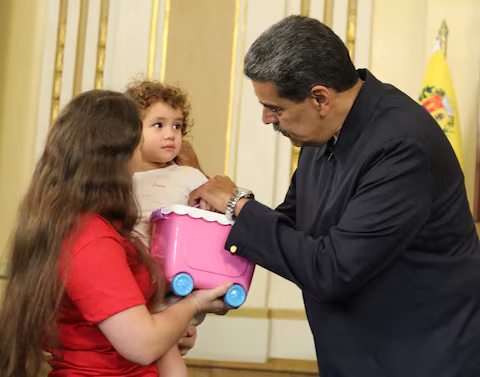On May 14, 2025, a two-year-old Venezuelan girl, Maikelys Espinoza Bernal, was reunited with her mother and grandmother in Caracas after being separated from her parents in the United States. The child had remained in U.S. custody for nearly a year following her parents’ deportation. Her return was facilitated by U.S. officials and acknowledged by Venezuelan President Nicolás Maduro as “an act of justice.”
Background of the Separation
Maikelys and her parents, Yorely Bernal and Maiker Espinoza, crossed the U.S.-Mexico border in May 2024. Shortly thereafter, both parents were deported under the Trump administration’s enforcement of the 1798 Alien Enemies Act, which allows for the detention and deportation of nationals from countries considered hostile during times of war. While her parents were removed, Maikelys remained in the care of the U.S. Office of Refugee Resettlement.
Controversial Deportations and Allegations
Maiker Espinoza was deported to El Salvador and detained at the high-security Terrorism Confinement Center (CECOT). The U.S. Department of Homeland Security accused him of being a lieutenant in the Tren de Aragua gang, alleging involvement in various criminal activities. His family has denied these claims, asserting that the allegations are politically motivated.
Yorely Bernal faced unsubstantiated accusations of recruiting for drug smuggling and sex work. Her family disputes these allegations, emphasizing the lack of evidence and due process in her deportation.
Reunion and Political Implications
Maikelys arrived in Caracas on a deportation flight alongside other migrants. She was greeted at the airport by First Lady Cilia Flores and later reunited with her mother and grandmother at the presidential palace. President Maduro publicly thanked U.S. President Donald Trump and his envoy, Richard Grenell, for facilitating the child’s return. Maduro described the reunion as “an act of justice,” highlighting the humanitarian aspect of the case.
Observers suggest that the child’s return may be linked to broader political negotiations between the U.S. and Venezuela, potentially involving the quiet departure of Venezuelan opposition figures with U.S. support. However, details of such arrangements remain undisclosed.
Broader Context and Human Rights Concerns
The case has drawn attention to the Trump administration’s immigration policies, particularly the use of the Alien Enemies Act to deport individuals without thorough legal proceedings. Human rights advocates have expressed concern over the lack of due process and the potential for wrongful deportations.
A recent video released by One America News Network showed Venezuelans detained at CECOT pleading for freedom, raising questions about the treatment of deportees and the conditions of their detention. Families of the detainees have reported difficulties in contacting their loved ones and obtaining legal representation.
Conclusion
The reunion of Maikelys with her family marks a significant moment in a complex and emotionally charged case. While her return brings relief to her family, it also underscores the challenges and controversies surrounding immigration enforcement and deportation policies. The situation highlights the need for transparent legal processes and consideration of humanitarian concerns in immigration cases.
Source: Reuters



